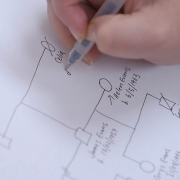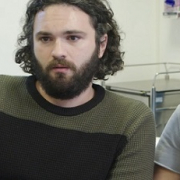GEP fellow publishes research on patient experience
Lisa Ballard and her co-authors hope their findings about the consent process for genomic testing will inform the new NHS Genomic Medicine Service
The consent process for genomic testing is complex and involves communicating multiple considerations. Below, GEP fellow Lisa Ballard tells us more about her recent research into the experience of patients who took part in the 100,000 Genomes Project, and what we can learn from them.
Genomic sequencing: a complex consent conversation
The 100,000 Genomes Project1 was set up to analyse whole genome sequences from patients living with rare disease or cancer, with the aim of both improving care and conducting further research. The final genome was sequenced in December 2018. Findings are being returned to patients, and the data collected continues to be analysed for research purposes.
Genomic sequencing looks at large parts of the genome and has implications not only for the person being tested but for their family members as well. The kinds of results produced can be unexpected and hard to predict2. This complexity, together with the need for genomic data for further research into genomics, makes for a challenging consent process which is the focus of many researchers and policy makers.
Time to reflect
To explore the challenges of consent for genomic testing and the experiences of patients and families so far, we consulted participants from the 100,000 Genomes project. The new NHS Genomic Medicine Service has now been established in England, and seeking the views of participants is vital if we are to ensure that the service builds on previous work and is of maximum benefit to participants and their relatives, as well as protecting them from harm.
We used two methods to collect data: a survey and an interview. We received 1,337 completed surveys and interviewed 24 of these participants. Survey responses were analysed using descriptive statistics and interview data were analysed thematically.
The findings
We identified two main themes in our data. The first theme, “I don’t remember, maybe I didn’t understand it completely”, describes: how some participants struggled to remember the nature of the decisions they had been asked to make; the various misconceptions they held about the project; and a lack of awareness when it came to the key implications of the project, for example the potential relevance for family members, or how likely finding a diagnosis would be. The second theme, “I don’t remember much, and I don’t understand everything, but that’s OK”, describes a feeling of confidence in health professionals and a lack of concern about detail. In short, these individuals trusted that health professionals, and the project, would act in their best interests, and agreed to take part based on this rather than studying the large amounts of information they were provided with3.
According to our research, there was uncertainty amongst participants regarding the complexities of the project and the types of results they might receive. For example, 20% of participants who we surveyed from the cancer arm of the project did not recall what decisions they had made about additional findings.
Our findings have led to the following question: Are participants in the 100,000 Genomes Project prepared for the issues that arise from not remembering or understanding discussions had and decisions made in the initial consent appointment?
In our paper we conclude that:
- consent at the outset of a project/the testing process cannot bear the weight of all later decisions about what findings to feed back to patients;
- it is important to assess (and document) an agreement to take part, but complicated decisions about what and when to communicate may need revisiting over time; and
- giving participants a copy of their consent forms may be a useful step in allowing people to remind themselves of the decisions they made at the time of their initial consent conversation but it shouldn’t be assumed that an individual continues to hold the views that they had at the time of the consent conversation.
The paper highlights the need for further discussion about the role of consent in the NHS Genomic Medicine Service — how can we best help our patients, and how should we respond to questions that patient consent alone cannot answer?
- Caulfield M, Davies J, Dennys M, Elbahy L, Fowler T, Hill S, et al. The 100,000 Genomes Project Protocol2017. Available from: https://www.genomicsengland.co.uk/wp-content/uploads/2017/03/GenomicEnglandProtocol_151117-v4-Wales.pdf.
- Horton R, Lucassen AM. Consent and autonomy in the genomics era. Curr Genet Med Rep. 2019;7:85-91.
- Dheensa S, Lucassen A, Fenwick A. Fostering trust in healthcare: Participants’ experiences, views, and concerns about the 100,000 genomes project. Eur J Med Genet. 2019;62(5):335-41
–









